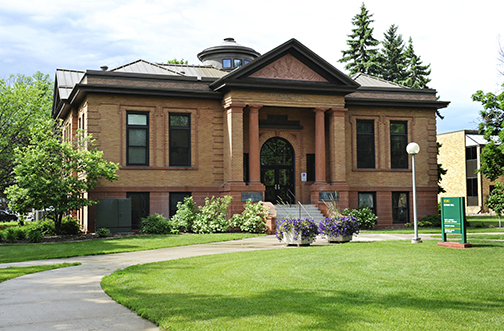
Political Science
This is an archived copy of the 2021-22 catalog. To access the most recent version of the catalog, please visit https://catalog.ndsu.edu.
Political science is the study of politics, public policy, government and related topics. This includes the investigation of political behavior, international relations, law, and political values. The coursework in political science provides students with knowledge and understanding of how government and politics affect their everyday lives and ultimately prepares students for careers in a variety of politics- or government-related professions.
The Program
The political science program at North Dakota State University offers a number of avenues for the study of government. The curriculum in political science ensures that students graduate with a solid knowledge of key political science subfields, including American government and institutions, the legal system and Constitutional law, international relations, and comparative politics. In addition to the many course offereings available at NDSU, students can draw upon many additional courses through Tri-College University (a consortium of NDSU, North Dakota State College of Science, Minnesota State Community and Technical College, Minnesota State University Moorhead and Concordia College). The urban center of Fargo-Moorhead enables students to observe and participate in metropolitan judicial and governmental affairs.
Internship/Field Experience
The Department of Political Science & Public Policy has been very successful in helping students secure internships in local, state, and federal agencies where they can experience first-hand the functioning of government. NDSU students also regularly serve as interns for elected officials from North Dakota and Minnesota.
Career Opportunities
One out of five persons in the United States today is employed by some level of government. The expansion of the public sector has created a vital need for thoughtful and active people who are professionally trained in government and in political science. The type of jobs available to NDSU political science graduates include policy analyst, budget analyst, lobbyist, legislative aide, state or federal program administration, city/county administration, positions in non-profit organizations, diplomatic service, and other careers.
Political science students also regularly go on to attend law school and then pursue a legal profession. NDSU political science students have attended law schools such as the University of North Dakota, the University of Minnesota, the University of Michigan, the University of Washington, Northwestern University, Duke, and George Washington University. Still other NDSU political science students may elect to go on for graduate study in political science, public policy, or public administration and pursue advanced careers in public administration, regional planning, as researchers at think tanks, or as academicians.
Extra-Curricular Activities
The Department of Political Science & Public Policy works closely with the Pre-Law Club, which is designed to provide students with information about law schools, entrance examinations and career opportunities in the field of law.
The Faculty
Thomas Ambrosio, Professor, Ph.D., 2000, University of Virginia
Nicholas Bauroth, Professor, Ph.D., 2003, Loyola University
Ethan Boldt, Assistant Professor, Ph.D. 2019, University of Georgia
Sarah Boonstoppel, Assistant Professor, Ph.D., 2014, University of Maryland
Steven Briggs, Associate Professor, Ph.D., 2007, University of Nebraska -- Omaha
Kjersten Nelson, Associate Professor, Ph.D., 2009, University of Minnesota
Daniel Pemstein, Associate Professor, Ph.D., 2010, University of Illinois at Urbana-Champaign
Sample Program Guide
Please note this is a sample program guide and not an official curriculum. Actual student schedules for each semester will vary depending on start year, education goals, applicable transfer credit, and course availability. Once admitted, students are encouraged to work with their assigned academic advisor on a regular basis to review degree progress.
| First Year | |||
|---|---|---|---|
| Fall | Credits | Spring | Credits |
| POLS 110 or 115 | 3 | POLS 220 or 225 | 3 |
| MATH 104 or 103 | 3 | HUM/Fine Arts and Cult Div Gen Ed | 3 |
| ENGL 110 | 3 | ENGL 120 | 3 |
| HUM/Fine Arts and Glob Persp Gen Ed | 3 | Science/Tech Gen Ed | 3 |
| COMM 110 | 3 | Minor | 3 |
| 15 | 15 | ||
| Second Year | |||
| Fall | Credits | Spring | Credits |
| POLS 240 | 3 | POLS 325 or CJ 325 | 3 |
| POLS 200-300 level elective | 3 | AHSS Requirement | 3 |
| STAT 330 | 3 | Wellness Gen Ed | 3 |
| Science w/ Lab Gen Ed | 4 | Minor | 3 |
| Minor | 3 | General Elective | 3 |
| 16 | 15 | ||
| Third Year | |||
| Fall | Credits | Spring | Credits |
| POLS Area 1 | 3 | POLS Area 2 | 3 |
| POLS Area 3 | 3 | POLS Area 4 | 3 |
| ENGL 320 or 358 | 3 | Science/Tech Gen Ed | 3 |
| Minor | 3 | AHSS Requirement | 3 |
| AHSS Requirement | 3 | Minor | 3 |
| 15 | 15 | ||
| Fourth Year | |||
| Fall | Credits | Spring | Credits |
| POLS elective | 3 | POLS 489 | 3 |
| POLS elective | 3 | Elective | 4 |
| Minor | 3 | Elective | 3 |
| 300-400 level general elective | 4 | 300-400 level general elective | 3 |
| 300-400 level general elective | 3 | ||
| 16 | 13 | ||
| Total Credits: 120 | |||
